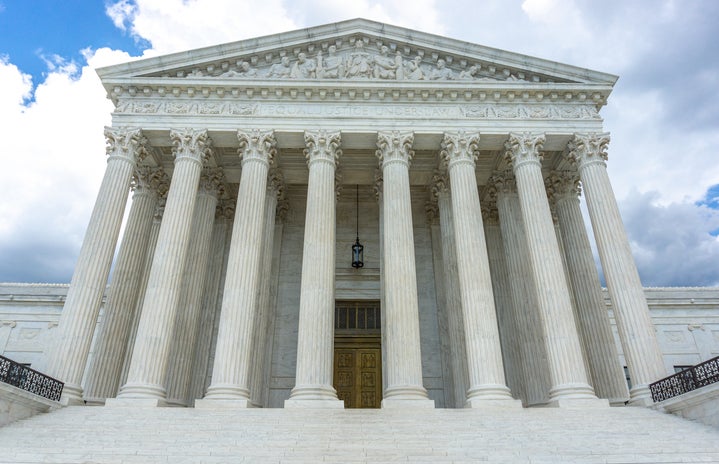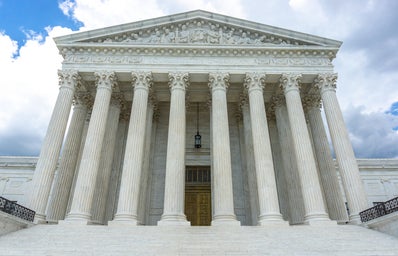If you’re anything like me, you’ve been panicking nonstop ever since you heard about the Supreme Court’s leaked draft opinion to overturn Roe v. Wade, and especially now that it’s been officially overturned as of June 24 in a 6-3 majority. At this point, I doubt you need anyone else telling you why this decision will have catastrophically bad consequences, and there’s no reason why women today should have less rights than women 50 years ago.
Yet an important piece of this story is that the six justices who voted to overturn Roe v Wade, Chief Justice John Roberts, and Justices Samuel Alito, Clarence Thomas, Neil Gorsuch, Brett Kavanaugh and Amy Coney Barrett, (three of whom were appointed by Donald Trump) are all conservatives, and have ties to Catholicism (Gorsuch is Episcopalian, but was raised Catholic). Justices Alito and Kavanaugh adhere strongly to their Catholic faith, and Justice Coney Barrett has granted the religious right several wins during her time as a judge. According to the New Yorker, Coney Barrett signed an open letter in 2015 to Catholic bishops that affirmed the Church’s teachings on the sanctity of life. These justices prescribe to the Christian stance against abortion, believing that life begins at conception.
I am Jewish, and I’m certainly not opposed to people identifying with a certain religion. However, I don’t impose my religion on others. Nevermind that five out of the six votes are from men who think they can make decisions on women’s bodies, I also have a problem with six justices thinking they can restrict anyone’s religious freedom. Because not only does the overturning of Roe v. Wade infringe on my rights as a woman — it also infringes on my rights as a Jew.
Separation of Church and State?
First things first: Whatever happened to the separation of church and state? It goes without saying that religion and politics shouldn’t mix at all, no matter the religion. Mexico is one of the world’s most Catholic countries, and they decriminalized abortion in 2021. That goes to show that even while a lawmaker may have certain religious beliefs, those beliefs shouldn’t dictate how they govern or how others live their personal lives.
During her confirmation hearings last spring, Justice Ketanji Brown Jackson was grilled on her religious views and how often she went to church. She was reluctant to answer these questions, because again, they have nothing to do with her job.
None of the six justices on the opinion have explicitly stated that they were voting to overturn Roe v. Wade out of religious duty or that they opposed the separation of church and state. However, according to USA Today, Justice Coney Barrett argued in a 1998 article that judges should have the right to judge based on “ideological bias” and “that Catholic judges (if they are faithful to the teaching of their church) are morally precluded from enforcing the death penalty,” with a footnote pointing to similar arguments about recusal in abortion cases.
Judaism and Abortion
I’d like to clarify that like with every religion, there are several branches of Judaism that vary on how strictly they adhere to religious rules, so a more orthodox Jew may have a different stance than myself. That said, the Jewish stance on abortion differs from the Catholic stance, and the decisions these Supreme Court Justices make should be made with all Americans in mind. In fact, a reported 83% of American Jews believe that abortion is a legal right.
In short, Judaism doesn’t outlaw abortion. Jewish texts don’t cite life beginning at conception, nor do they legally consider a fetus to be a person. Furthermore, Jewish laws actually dictate that an abortion is required if the mother’s life is at stake. Admittedly, more stringent branches of Judaism are stricter on abortion. But Jewish feminists have always been at the forefront in the battle for reproductive rights. Supreme Court Justice Ruth Bader Ginsburg, now known as a feminist icon, was a practicing Jew herself.
The majority of American Jews, including myself, identify as reform. My rabbi is also a woman, so the importance of religion and female voices has been ingrained in me from a very young age. Therefore, I am religiously opposed to silencing and controlling women or anyone with a uterus. Not having access to the healthcare that has been fought for so staunchly goes against my Jewish faith.
As a Jew, I obviously prescribe to different ideologies than these justices. And not only do I deserve a right to an abortion as a woman wanting to make decisions about my own body, but I also have the right to an abortion as a Jew, as dictated by my religion. That, my friends, is not religious tolerance.
Our Christian Foundations
The U.S. is home to many religions, but Christianity still dominates this country religiously and how we function implicitly and explicitly. Just to name a few quick examples, student holidays have historically revolved around Christmas and Easter. Plus, several state mottos reference God in some way, and many establishments close on Sunday.
To tell you the truth, none of this really bothers me; I can do my shopping on a Saturday if need be. I just point these facts out to show how ultimately, I believe the U.S. is indeed built on a Christian foundation, despite not having an official religion. But what I do care about is when these Christian foundations restrict bodily autonomy for Christians and non-Christians alike.
Stripping Away Our Freedoms
The overturning of Roe v. Wade will have disastrous consequences for anyone who can get pregnant. But something else that worries me is what implications this ruling will have for religious freedoms in the United States. This overturns an existing precedent in the Court, making it even more contentious: What else could a Christian lawmaker get away with in the name of their religion? Could the Supreme Court even overturn same-sex marriage? I know this all sounds scary, but to be frank, this ruling sets a terrifying precedent in the name of the religious right.
Surely, a non-Christian lawmaker who tried to pass laws in the name of their religion would be met with vitriol. Non-Christian lawmakers, like Representative Ilhan Omar, already face harassment from their fellow politicians and constituents. So, I pose the question, why are these six justices seemingly above separation of church and state?
Everyone has their own relationship with religion and their bodies. I don’t expect how I feel about my body or my religion to be how you feel about yours. I’m definitely not here to proselytize my views to you as a Jew; in fact, Jews generally don’t proselytize at all. Perhaps, then, our lawmakers should take a hint and stay in their lane.


